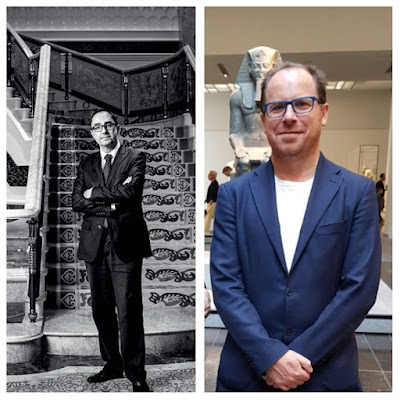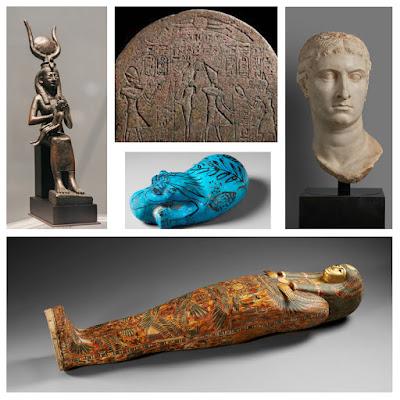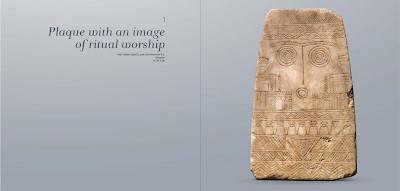In a hearing that took less than an hour at the Geneva police court,
Ali Aboutaam, the owner of the Geneva gallery Phoenix Ancient Art SA has been sentenced by the Swiss authorities. Following on a complex and multi-year criminal and procedural investigation by officers and analysts with Switzerland's customs and anti-fraud divisions, working with the Geneva Public Prosecutor's Office, the Swiss-based merchant has been found guilty of forgery of titles. A misdemeanour under Swiss law on the transfer of cultural property, his admissions come with an 18-month suspended prison sentence, three years probation and requiring him to pay procedural costs totalling 450,000 francs or approximately €454,410.
The courts also confirmed the seizure of 42 artefacts, confiscated due to their illicit origin which will be devolved to the Federal Office of Culture. Several dozen other antiquities will be returned to the countries of origin.
Aboutaam's conviction and sentencing comes in response to a conspiracy which proved that the art dealer, with the help of accomplices, produced false certificates of provenance in relation to ancient art objects in circulation. Aboutaam was also found guilty of having knowingly paid at least one accomplice, who sourced antiquities from illicit excavations in various countries of the Middle East.
A statement extracted from the Swiss indictment read:
"Ali Aboutaam knew or must have assumed that they had been wrongfully acquired".
This particular Swiss investigation dates back to 20 December 2016 when around 5:10 p.m., at around 17:10 hours, when arriving from France by car, a Swiss border patrol officer stopped a grey Land Rover vehicle, registration No. GE777994 registered to the company Phoenix Ancient Art SA, rue Verdaine 6 & 1204 Geneva at the Veyrier border checkpoint. The car had been driven by Ali Aboutaam's driver and was transporting then-Germany based antiquities dealer Roben Galel Dib as a passenger.
The testimony of the two persons revealed that Dib was in possession of an antique oil lamp, which neither the driver, nor the purported owner of the lamp, were able to provide documentation for proving the object’s provenance to the officers’ satisfaction. Dib told authorities he was coming to Switzerland to "meet a girl" and that he was carrying the lamp with him because he had just had an appointment on this subject in Paris to have it restored. The object was sequestered, and an inspection of the car revealed the presence of 3 receipts for the rental of two storage units at the company Flexbox Self Storage, route du Nant-d'Avril 40 in 1214 Vernier, in the name of a conservator in Chanoy.
Both the driver and Roben Dib were released after questioning around 2:00 AM the following morning, while on or around that same time surveillance footage of the storage warehouse listed on the receipts found in the car captured Ali Aboutaam’s wife, Biljana Aboutaam, the family's chauffeur and a housekeeper participating “several movements of merchandise". Predicated on the foregoing, Swiss Customs Administration developed a “strong suspicion” that the warehouse was being used to store illegally imported art and antiquities.
As is publicly now known, Roben Dib is the business partner of Hamburg-based dealer of Egyptian art Serop Simonian. Dib was arrested in Hamburg by German police on suspicion of art trafficking in August 2020 and released after only five weeks behind bars.
Subject to a European Arrest Warrant, Dib was then rearrested in Paris, France on 22 March 2022 after traveling there to discuss charges related to dealing in illegally trafficked Egyptian antiquities with French authorities.
Both Dib and Simonian have been tied to million dollar illicit antiquities which have made their way (illegally) into the Metropolitan Museum of Art, the Louvre Abu Dhabi, and museum and private collections throughout the world on the basis of false provenance documentation, a subject which has been covered with frequency on this blog.
In January 2016, a 3rd millennium BCE, alabaster plaque was displayed at the European art fair BRAFA after first passing through Port Franc, the free port of Geneva to Inanna Art Services, a subsidiary of Phoenix Ancient Art. This artefact, according to a qualified Syrian archaeologist, likely came from the ancient Mesopotamian city of Mari.
This artefact was confiscated following an inspection operation, carried out by the Belgian Federal Public Service Economy (French: SPF Économie, Dutch: FOD Economie) along with a marble table in the context of a suspicion of illicit trafficking in antiquities.
The plaque was first identified in the Aboutaam's Phoenix Ancient Art 2012 - Crystal IV catalogue, which listed the 39.5 cm 3rd millennium BCE plaque with an image of ritual worship as having a provenance of:
"Ex Elie Bustros Collection, Beirut, 1950s-1960s"
implying that the artefact may have come from the Beirut dealer Elias (Elie) Bustros, purportedly active from at least the 1930s through by some records the 1980s.
It should be noted that in addition to its Ottoman Empire laws an antiquities, the Syrian Republic's Antiquities Law, Decree No. 222, was enacted in 1963. That law vested ownership of all antiquities in the State and prohibited the sale or transfer of antiquities without governmental approval.
This is not, however, the only incidence where "Ex-Elie Bustros Collection" has been used in connection with an artefact handled by Phoenix Ancient Art.
Elias Bustros, Beruit 1950’s-1983;
(Gawain McKinley, England, on behalf of Selim Dere and Sleiman Aboutaam, 1986)
Selim Dere is the owner of a New York antiquities gallery, Fortuna Fine Arts where Manhattan authorities executed a seizure warrant in June 2018. Erdal Dere (the son of Aysel Dere and Selim Dere), was indicted in the US indicted in relation to a conspiracy to defraud buyers and brokers in the antiquities market with the use of false provenance documentation.
The Belgian identifications resulted in a separate four-year investigation overseen by the Belgian federal prosecutor's office into the activities of the Aboutaam brothers, who opened a branch of Phoenix Ancient Art in the city of Brussel's Sablon in 2017. This branch was subject to police raids in 2019 ordered by Judge Michael Claise.
By June 2021, a Lebanese intermediary of Phoenix Ancient Art had already been condemned by the Geneva public prosecutor for having imported archaeological objects looted in the Middle East. This individual was identified as having travelled to Geneva four or five times a year, for four years, to deliver ancient objects to Ali Aboutaam. Arrested in Romania, he was extradited at the request of the Geneva public prosecutor's office.
That same year, in November 2021, Ali Aboutaam was handed a 1.6 million francs fine via Swiss customs, including the costs of the proceedings. The tax authorities came after the dealer in this instance for having imported 37 million francs worth of antiquities into Switzerland between 2010 and 2017 without paying the applicable VAT.
Which brings us back to the present, the Swiss indictment, accepted by Ali Aboutaam within the framework of a simplified procedure, acknowledges the following, verbatim:
"Ali Aboutaam, in his capacity as administrator of Phoenix Ancient Art SA, has asked art experts, or has asked employees of Phoenix Ancient Art SA to obtain from art experts: produce and/or sign false invoices; and/or produce or cause others to produce documents indicating source that are contrary to reality, sometimes contained directly in invoices; and/or provide untrue source indications for use by others."
In another section of the indictment, Aboutaam agrees that the falsification of provenance documentation was done to launder the artworks, giving them:
"a pedigree aimed at dispelling suspicion of illicit provenance and/or to facilitate their customs transfer with a view to their sale on the art market through Phoenix Ancient Art SA, Tanis Antiquities LTB and Inanna Art Services SA, i.e. companies of which Ali Aboutaam has Control."
The mention of Tanis is significant. It helps conceptualise the range of years where this shell company has been linked to questionable transactions and laundered antiquities. In 13 December 2003 Hicham Aboutaam, Ali's brother, was arrested in the United States and charged with smuggling the silver ceremonial drinking vessel known as a rhyton into the United States from Iran and falsely claiming that it came from Syria. That 2003 government complaint identified the gallery’s affiliate office in New York as "the Bloomfield Collection" and informed that the invoice for the artefact, declaring Syria as country of origin was issued by Tanis Antiquities, Ltd.
Tanis Antiquities, Ltd comes up again very recently in the ongoing important French investigation involving materials sold to the Louvre Abu Dhabi. As reported by the French newspaper Liberation, French investigators discovered that Jean-François Charnier's sister, Marie-Christine Charnier, had received money from the Aboutaam family via an account opened in a Moroccan bank, paid from the offshore structure controlled by the merchants, again, Tanis Antiquities Ltd., based in Saint Vincent and the Grenadines.
The legal representative for Tanis Antiquities Ltd is, a Canadian citizen, of Lebanese origin, resident of Geneva, Ali Aboutaam.
I will close this article by mentioning that this is not the first occasion where the Aboutaam family, or Ali personally, has had run ins with legal authorities for their involvement in the circulation of suspect artefacts originating from varying jurisdictions regarding trafficked objects from the Middle East. In April 2004 Ali Aboutaam was tried in absentia in an Egyptian court and pronounced guilty and sentenced in absentia to 15 years in prison in a long-running trafficking ring that had smuggled Egyptian artefacts through Switzerland to Western dealers and galleries. That investigation resulted in the convictions of 25 defendants, including several high-ranking Egyptian police and government officials and nine foreigners.
 artemis,Australia,Egypt,Egyptian,Egyptian antiquities looting,Jeff Hallen,Mike Sigler,Relics of the Nile
artemis,Australia,Egypt,Egyptian,Egyptian antiquities looting,Jeff Hallen,Mike Sigler,Relics of the Nile
 No comments
No comments
.jpeg)













